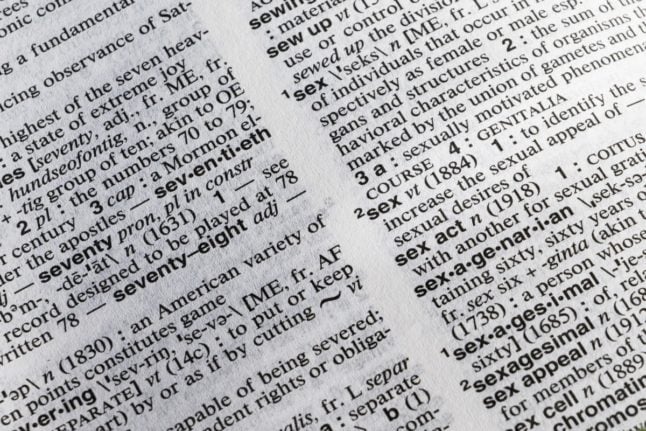1. Pillow talk
 Photo: Henrik Berger Jorgensen/Flickr
Photo: Henrik Berger Jorgensen/Flickr
Improving your understanding of irregular verbs is usually the furthest thing from your mind when lying in bed with your French lover. However, some expats have found that exchanging sweet nothings can be a great way to pick up a phrase here and there. “Seriously, nothing focuses your mind quite like sex, and later on, you’ll find you were really paying attention to every word,” says American burlesque dancer Brian Scott Bagley.
2. Listen and repeat
Your best, most easily-available French teachers are the French. So when they speak, mimic all their little phrases. “There’s no need to reinvent the wheel when trying to express yourself,” says English blogger Victoria Wall. “If you say ‘merci’ and a French person replies ‘Je vous en prie,’ then say that next time for ‘You’re welcome.’ No need to scratch your head and blurt out ‘Vous..etes..bienvenue’ – the French have already figured it out, so just repeat after them.”
3. Get smarter with your smartphone
These days there's an app for everything, including learning French. Several of them actually. The benefits are that many of the apps feel more like games, you can learn on the go or whenever you have a spare minute, and many of them are free or very cheap. Try checking out Duolingo to start, and see our list of top smartphone apps for learning French.
4. Turn subtitles on
 Photo: Gomazio ASBL/Youtube
Photo: Gomazio ASBL/Youtube
Watching French movies with French subtitles on can be a huge boost to your understanding of the language. If reading French is your forté, then hearing the words spoken alongside the text will vastly improve your ear. And if you hear and understand the sounds and phrases of French just fine, then having it written down will help you link the two together. And of course, you can watch your favourite English-language films with French subtitles too.
5. Listen to the news
You can keep yourself up to date on current events and learn French at the same time just by listening to some French radio in the morning. If you find that they speak too quickly for you to understand, try the News in Slow French, a weekly news roundup that you can listen to in slowly-spoken French. A surefire way to get your comprehension skills up to speed.
6. Go back to your childhood roots
Several French-speakers who taught themselves recommended this one. Watch cartoons on TV, read children’s books, and don’t be ashamed to enjoy it. “The French is at a beginner’s level, it’s very easy to pick up, and the TV shows especially are full of little word games that will really help. And it’s fun!” says Brian Scott Bagley.
7. Play
 Photo: The Local
Photo: The Local
Learning a language cannot be all work and no play or you will soon lose interest. “Do crossword puzzles in French or play scrabble or learn the words to your favourite French songs,” says Lynn McBride.
8. Phrase of the day
“I put French phrases on my calendar so I can learn one each day,” says Lynn McBride. “I will try to learn and use that phrase during the day.” This tip requires a bit of discipline, organization and a decent-sized calendar. Although it may not sound like much, if you really learn the phrase each day you will soon find it easier to pick up and use other words and expressions.
9. Turn GPS to French
 Photo: Cheon Fong Liew/Flickr
Photo: Cheon Fong Liew/Flickr
Driving in France might be daunting enough without having your GPS barking orders at you to “tournez à gauche” or continue “tout droit” at the “rond-point”. Nevertheless, asking your GPS guide to speak to you in French instead of English is a handy way of forcing yourself to hear and understand the language you are trying to learn, says author Lynn McBride. Just give a little bit of extra driving time to cover for getting lost.
10. Get sporty
Not on your own of course, and not just with expats. The French love their sport and there are thousands of local clubs up and down the country that cater for everything from running to rugby and probably darts too. Join up. “You just have to throw yourself in at the deep-end. I joined a local rugby club, which helped a lot. You socialize and mix with the locals,” reader Nick Ord says.
11. Cooking
Combining work and pleasure is always the best way to learn. If you enjoy cooking then force yourself to ditch your Jamie Oliver English cook book and opt for Raymond Blanc’s recipes instead – in French of course. Not only will you learn plenty of names for ingredients, but there’ll be plenty of useful verbs in there too and you might just become a Michelin star chef in the process.
12. Talk to yourself
This might sound a strange tip and it might raise a few eyebrows from other patrons in the café you're in, but Lynn McBride says “you’ll come up with lots of phrases and words that you don’t know and will then want to look up.” If you get bored of talking to yourself you can always do a little bit of role play with your alter ego – the moody French waiter, your French boss at work or even the French man or woman of your dreams… but maybe not in public.
13. YouTube tutorials
There are so many of them you can get lost. But just do one a day for the rest of your days and you'll improve your French to a point where you can start doing your own YouTube tutorials.
A previous version of this article was published in 2013. But seeming as though we are all still struggling with French we decided to publish an updated version.



 Please whitelist us to continue reading.
Please whitelist us to continue reading.
Member comments